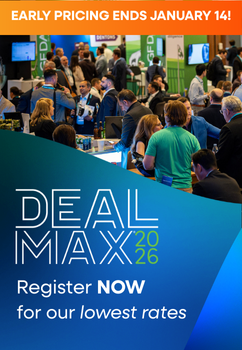

Listen. Provoke. Love. Simplify. Believe.
These five words comprise the personal creed of Jeff Jones, who spoke before an audience of 85 Association of Corporate Growth members and guests on Friday, October 12. He relied on these words, he said, when he decided to leave his job as president of Uber – where he was responsible for a $20 billion business in 450 cities – and when he accepted the role of chief executive officer at Kansas City’s own H&R Block, Inc. (NYSE: HRB).
Jones presented to ACG near his one-year anniversary at H&R Block and in Kansas City, and during his talk he shared what he’s learned so far, his new strategic pillars for the 63-year-old company, major initiatives for 2019 and more.
Jones, a graduate of the University of Dayton and Fork Union Military Academy, brings to his role of CEO experience at some of the nation’s most recognized brands. Before Uber, he spent for years as executive vice president and chief marketing officer at Target Corp. Prior to Target, he held executive and leadership roles with The Coca-Cola Company, Gap and Leo Burnett, the prominent advertising agency, where he served General Motors, Miller Brewing and Procter & Gamble.
He has been named “One to Watch” by The Wall Street Journal and “One of the World’s Most Influential CMOs” by Forbes, and his work has been profiled by Harvard Business Review.
After leaving Uber in March 2017, Jones said he was fortunate to have several job offers. He said five factors led him to choose H&R Block: It was in the business of helping people; it had a trusted brand with scale; it had a culture grounded in ethics and integrity; it had strong financials; and the board had a desire for business transformation.
Above all, he said, the company was founded on the “simple premise about helping other people” with something they truly need – “and most of my career was spent trying to get people to buy things they don’t need.”
In his first few months at the company, Jones set out to take an inventory of the company’s strengths, challenges and data: “We know our financial performance hasn’t been good enough. We need to understand why.”
He said H&R Block has six major assets:
- A well-known, trusted brand synonymous with taxes;
- Rapidly improving do-it-yourself products with growing market share;
- Emerging “virtual” capabilities – a halfway point between do-it-yourself and assisted tax prep;
- Improving business performance;
- Strong financial position; and
- A culture willing to change.
Meanwhile, however, there are seven “foundational challenges”:
- How to grow the “assisted clients,” individuals who get in-person tax counsel;
- A price/value equation that’s out of balance;
- An undifferentiated brand;
- Too much investment in “business as usual” technology;
- A fear that do-it-yourself products will cannibalize the core tax prep business;
- Inconsistent service delivery; and
- Too much focus on tax season.
“It’s a unique business when you do all your business in four months,” he said. “If you have a mindset you’re only looking one season at a time, it keeps you from innovating. To many times, we would do something for one tax season, then declare it worked or didn’t work. We have to compete a season at a time, but take a multiyear view.”
To excel over the next three to five years, Jones said, he plans to place a renewed focus not just on taxes – one of life’s few certainties, as the old saying goes – but on the human connection to H&R Block’s clientele.
“People here tell stories about what it means to have a relationship with someone who had a tough time. Maybe getting them a $3,000 return makes a fundamental difference,” he said. “We distill that into what the purpose of the company is: ‘To provide help and inspire confidence in our clients and communities everywhere.’
“We’re putting clients back in center and communities back in center. I never want to say we’re going back – you can’t go backwards – but we’re rediscovering who we are.”
As a part of that discovery, Jones developed five strategic pillars for H&R Block. The company will:
- Elevate talent and culture: “We can’t do what we need to do without a higher standard for excellence.”
- Own a sustainable brand position: “We need to make it really clear to consumers who we are and who we’re for.”
- Win on customer experience, both online and in physical locations.
- Build operational excellence: “This is the less sexy stuff – being higher quality, being more efficient, having a mindset of removing waste from the business, getting better at what we do.”
- Invest for the long term: “This is not about winning next tax season. It’s about ensuring the health and viability of H& Block for the next generation of tax preparers and consumers.”
Jones has shared these five pillars throughout the organization; every employee has a one-sheet summary. To execute on them, he shared the “big moves” planned for 2019:
- Invest the corporate tax rate benefit to lower prices.
- Begin executing against a new brand promise: “This isn’t just a place where you get cheap things. You get quality expertise in a way that helps you get the outcome you’re looking for.”
- Position do-it-yourself as a clear challenger brand to Turbo Tax.
- Innovate in virtual tax prep.
- Cultivate an intense focus on quality and consistency of delivery.
- Build a multi-year roadmap to modernize technology.
It will be a team effort, Jones said, but one he will guide as the company’s top executive.
“I’m the kind of leader that knows I don’t have all the answers,” he said. “We need the team to help us create things. We’ll figure this out together. My instinct is not to tell everybody what to do but to ask the questions that will provoke the conversation: When do I lean in more because the team needs it, and when is it OK to provoke and see where the team gets on their own?”

Register by January 14 to lock in the lowest rate and join 3,200+ dealmakers in Las Vegas on April 27-29, 2026.
